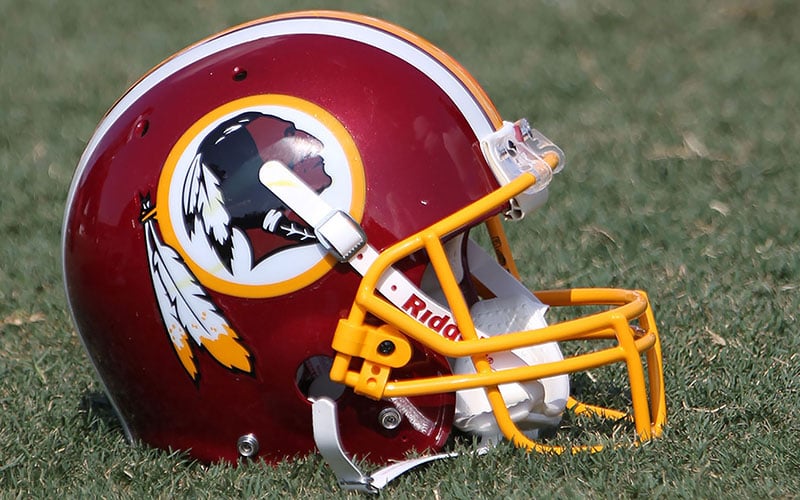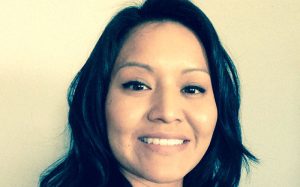
A federal court upheld a ruling by the U.S. Patent and Trademark Office that the Washington Redskins cannot hold trademarks for the term “Redskins,” calling it offensive to Native Americans. (Photo by Keith Allison via flickr/Creative Commons)
WASHINGTON – A “very happy” Amanda Blackhorse welcomed the latest victory Wednesday in her long-running feud over the Washington Redskins name, which the Navajo woman says is racist and should not have government trademark protection.

Amanda Blackhorse, a Navajo woman from Kayenta, is the lead plaintiff in the fight against the name of the Washington Redskins, a name she calls offensive to Native Americans. (Photo courtesy Amanda Blackhorse)
The U.S. Patent and Trademark Office ruled against the team last summer and a federal judge in Virginia granted summary judgment Wednesday to opponents of the name, rejecting all the team’s challenges to that trademark ruling.
Team officials said they plan to continue the fight and “look forward to winning on appeal after a fair and impartial review of the case.”
But Blackhorse, from Kayenta, and one of five Native Americans who challenged the trademark, said in a statement released by her lawyers Wednesday that the ruling is about “humanizing the indigenous identity.”
Wednesday’s ruling is the latest in a fight that stretches back to 1992, when a separate group of Native Americans first challenged the team’s name.
In both cases, the opponents have asked the trademark office to strip the team of its trademark, arguing that the law does now allow a trademark that “may disparage” a group.
Racism or respect?
A timeline of challenges to the trademark on the word “Redskin,” which opponents call a slur but the team says respects Native Americans:
1992: Seven Native Americans petition the Trademark Trial and Appeal Board of the U.S. Patent and Trademark Office to cancel the trademarks.
1999: The board rules for the seven Native Americans in that case, Harjo v. Pro Football Inc., saying the name is offensive.
2003: A U.S. district court reverses the decision, saying it was not supported by evidence and the defendants waited too long to file their suit.
2005: A federal appeals court sends the case back to the district court to determine if one of the plaintiffs is barred by “laches” – waiting too long to file suit.
2006: Six different Native Americans, including Amanda Blackhorse, file a new petition with the TTAB.
2008: The district court declines to reconsider its 2003 decision in Harjo.
2014: The board finds in favor of Blackhorse and her fellow plaintiffs, canceling the team’s trademarks.
July 8: A U.S. district court judge in Virginia rejects the team’s legal challenge to the trademark order. The team has vowed to continue fighting.
Even though the trademark office agreed in June 2014 to cancel the trademark, that won’t take effect while legal appeals are pending. The team still holds a trademark on the name.
Should it ultimately lose, it could still use the name but could not prevent others from using – or selling – items with the name or logo.
Blackhorse, who has been battling the team for nine years, could not be reached for comment Wednesday. But her lawyers said their case has “demonstrated the disparaging nature of the team’s name.”
“Today’s ruling by the District Court resoundingly affirmed the Trademark Office’s decision,” said Jesse Witten, the attorney for Blackhorse and the others, in the statement.
But Washington Redskins President Bruce Allen said his confidence is rooted in history.
“We are convinced we will win because the facts and the law are on the side of our franchise,” he said in a statement released by the team, adding that the franchise has “proudly used the name Redskins for more than 80 years.”
The team has long argued that, far from being disparaging, the name Redskins is used as a sign of respect for Native Americans.
But Blackhorse said in the statement that she was “very happy with the ruling,” and proud of the national attention that has been brought to “the problems with the team’s name.”
The team has been using the name Redskins since 1933, according to the opinion by U.S. District Judge Gerald Bruce Lee, and the name became an approved and registered trademark in 1967. Four other variations of the name were also registered between 1974 and 1990, the opinion said.
Lee said the first informal complaints about the name came in the early 1970s, and the first official challenge came in 1992, when Suzan Harjo and six other Native Americans first petitioned the trademark office.
Most notably in 1992, joined six other Native Americans to petition to cancel the Redskins’ trademark registrations.
“It’s great news,” said Harjo, who is Cheyenne and Muscogee. “I’m so grateful for the perceptiveness and clarity of this good judge.”
The Trademark Trial and Appeal Board agreed to cancel the Redskins’ trademarks in 1999, but that decision was overturned by the U.S. District Court for the District of Columbia. Lee wrote that the case then “traversed back and forth between the district court and the D.C. Circuit.”
In 2006, while the first fight was still going on, Blackhorse and four others filed a petition to cancel the same six registrations Harjo had been petitioning against. That ultimately led to Wednesday’s ruling.
“After our 17 years in court and the Blackhorse plaintiffs’ years, finally there’s federal district court validation,” said Harjo, president of the Morning Star Institute.
Blackhorse said in her statement that her “nine-year-long battle has come down to this moment.”
“The court’s ruling demonstrates the team’s name is not an acceptable or appropriate term for Native Americans,” she said.